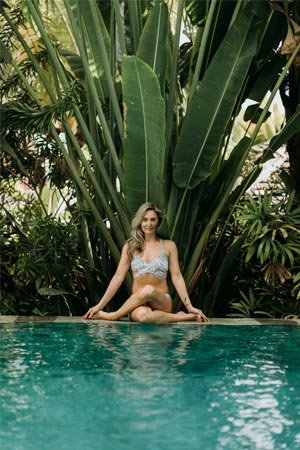
I found a blog the other day by Melanie Huser that reminded me very much of my personal experience of Yin Yoga. A self confessed Vinyasa junkie, in my earlier yoga years if someone said they love Yin Yoga, I’d politely smile and inwardly think they were just less motivated than me. I saw Vinyasa as the challenging, dynamic, fun style of yoga (and it is), and I saw Yin as the easy, cruisy style of yoga.
As a yoga teacher / studio owner, there have been times where I’ve had to jump in to teach classes that weren’t my favourite time slot, or even favourite yoga style. Due to necessity I found myself teaching Yin Yoga, when really I was simply teaching a stretch class.
I began to see the benefit of this slower practice to such an extent, that I ended up resting my weary body for an entire year. During that year I breathed, I meditated, and I practiced Yin & Restorative Yoga. My yoga practice wildly advanced.
You see, back then my life was a bit like a smoothie. A bunch of different ingredients thrown into a blender and whizzed up faster than you can say Chaturanga. My mind moved at the speed of light, I suffered regular injuries and I had zero balance between my work and social life. To sum it up I was existing in a constant state of physical and mental exhaustion. I practiced a lot of Restorative during this time in order to get the deep rest that I needed, but I found my power by practicing Yin.
The Yin Yoga blended in with my Meditation & Breathwork practices. In this trinity I found my Shakti (my creative essence & feminine power). At least 7 years along this path, I had come to understand the true art of Asana which translates as ‘to sit’ or ‘seat’. I would spend at least an hour each day sitting with the physical discomfort in my body, and ‘sitting’ with the myriad of thoughts in my mind.
Once a control freak, I was finding peace in allowing things to be as they were. As I lay in Swan Pose, an intense hip opener, I developed an inner strength which helped me to be still. My awareness would dance between my thoughts and my body. Back then, unless I was high on something (people, substances, activities) the experiences of both my body and my mind were uncomfortable. In these times of sobriety I began to really feel what it was to be alive. I began to care about myself. I craved these times alone in the studio, just me, my body and my thoughts. You could say I was falling in love. With me.
As I gently stressed my tissues, things were awakening, prana was flowing. What I didn’t realise was that my fascia was becoming stronger, more resilient and hydrated. Prana was beginning to move, awakening dormant memories and beliefs that were rising to be understood. I realised that I felt just as much in stillness as I did in activity. But this felt more stable, more powerful, more intimate.
Yin Yoga draws a lot on Chinese Philosophy, in particular the Tao Te Ching. In this, the importance of complimentary energies such as Yin and Yang are stressed. Just like a man needs his woman & a woman needs that man, so too do our Yang lives need some Yin.
Fast forward to now, more experienced at teaching and practicing yoga, I understand how the approach to teaching Yin is very different to teaching Vinyasa. It is not a ‘stretch class’. I also respect Yin Yoga alot more and realise it has nothing to do with motivation. You could say I’ve fallen in love with Yin just as much as I love Vinyasa.
Yoga. It teaches us to drop into life in it’s entirety. How can we be whole if we only want to see the light? How can we appreciate love if we don’t understand hate? How can we really embrace health if we have never been sick.
My practice of Yin (but also restorative and vinyasa) has allowed my body to transform, improve and adjust to be more in harmony with my environment. And I am in harmony with my environment now. If I don’t feel a sense of harmony, I respectfully move away from that person, environment or that activity. This takes inner quiet, strength and patience. Something that we learn in Yin very well.
Learn to teach Yin, or study it here.
Find out about our Yin classes and teachers here

Leave A Comment